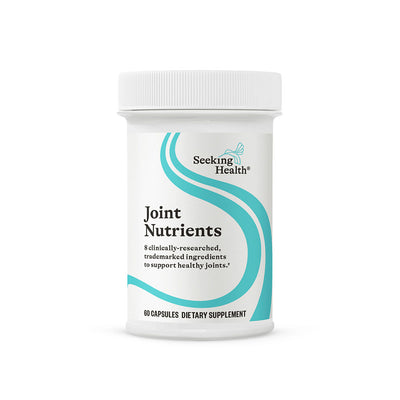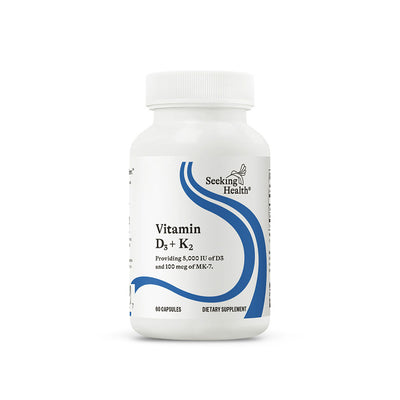
5 Crucial Things That Affect Immunity

It’s that time of year, where viral infections peak and it’s much easier to come down with the sniffles or a fever. Still, it’s entirely possible to support your body’s ongoing good health without ever succumbing to illness.
How your body’s immune system functions comes down to a complex interaction between numerous factors. When you focus on supporting your health before you’re sick, and optimizing how your body handles illness, you can actually focus more on preventive wellness and less on trying to bounce back after getting sick.
5 Crucial Things That Affect Immunity
It’s not possible for humans to avoid sickness forever. But when you understand the main factors that influence immunity and how your body handles germ exposures, you can target support to optimize your wellness.
These are the five factors that play a key role in staying healthy during cold and flu season.
The human gut is home to a diverse universe of bacteria that are essential for maintaining homeostasis, or balance, in the body. Good bacteria in the gut are also essential for keeping the immune system functioning optimally and for maintaining good health. (1)
These good bacteria can be obtained from food and supplement sources. They also reproduce on their own when given the right prebiotics, a special type of fiber. Good gut health starts with the right balance of good bacteria and the nutrients needed to nourish their diversity and replication.
- Stress
Short-term stress can be a healthy body response, but long-term or chronic stress can have negative health implications. When you’re too stressed out for too long, the result is suppression of the natural immune response and an increase in chronic inflammation. (2)
Modern society exists in a mostly stressed-out state, placing a high value on being busy and hustling. However, the benefits of slowing down, keeping priorities straight, and recognizing when self-care and health needs supersede busyness is a skill that will benefit much more than immunity.
- Hygiene
Germs are viewed as bad and the cause of disease, and in many cases they are. However, the cultural desire to sanitize everything is actually bad for the immune system. Immunity relies on a microbiome that is populated with good bacteria. However, antibacterial hand sanitizers and other cleaning products kill the good as well as the bad. A microbiome that has frequently had the good bacteria reduced is rife for the proliferation of the bad stuff.
Good handwashing techniques with a basic soap are more than adequate to cleanse the hands from germs like viruses or bacteria. You don’t need sanitizer or bleach to keep your house properly clean, either. In fact, the long-term effects of frequently using disinfectants are actually worse than getting an occasional cold, with children who are repeatedly exposed to sanitizers and disinfectants facing permanent gut bacteria alterations that can result in long-term health challenges. (3)
- Sleep
Lack of sleep is one of modern society’s worst epidemics. More than 30 percent of adults in the U.S. don’t get enough sleep. (4) This not only contributes to chronic disease risks like heart disease and diabetes but also being more susceptible to sickness and infection.
When sleep habits are perpetually short or interrupted, the result is an increased underlying stress response in the body that particularly impacts the immune system. The result is elevated levels of chronic inflammation along with a deficiency in immune function—both of which can lead to suppressed immunity and more frequent illness. (5)
Perhaps not everyone needs eight or more hours per night, but when you examine your sleep habits and routine, if you’re perpetually running short or making it a low priority, your overall health and immune defenses could suffer.
- Nutrient levels
The body requires many nutrients to function effectively. In order to have healthy blood, plenty of iron is required. For cellular protection, antioxidants are needed. For energy levels and nervous system health, the body needs a steady supply of B vitamins.
While these are generalized, the immune system also requires certain nutrients in order to properly function and protect the body. Running low in these nutrients can lead to more frequent illness, reduced immunity, and a harder time recovering.
Nutrients that are associated with healthy and optimal immunity are:
- Vitamin A: enhances immune function and supports normal inflammation levels (6)
- Vitamin C: supports both innate and adaptive immunity and works as a potent antioxidant in the body (7)
- Vitamin D: modulates and enhances both innate and adaptive immunity, and when levels are optimal, reduces infection and illness risk (8)
- Zinc: supports optimal function of both innate and adaptive immunity, and when levels are normal, decreases inflammatory responses in the body (9)
Many other nutrients are required for healthy immune function, along with a healthy lifestyle, plenty of sleep, and reduced stress levels. When you look at overall immunity from a big picture, it doesn’t come down to just one thing that weakens the body’s defenses and leads to sickness.
By focusing on providing support for various aspects of immunity, you can continue to stay healthy and focus on optimizing your wellness.
5 Supplements for Targeted Wellness Support
Wellness is something that can be maintained. Instead of working from a place of having lost it, these supplements will support your efforts to keep things optimal and healthy. While they may not be required on a daily basis, and the pulsing method could be employed by healthy individuals, when you’re working to maintain the optimal function of your immune system, it's important to make sure you’re getting enough.†
Working with your healthcare provider to determine your optimal nutrient intake to support ongoing good health is always a great step for personalized wellness.
- Vitamin C
An antioxidant and vitamin, vitamin C is a popular support for natural immunity.
Liposomal Vitamin C provides 1,000 milligrams of vitamin C in a non-GMO sunflower oil liposomal liquid form. By taking vitamin C in liquid and liposomal form, it can lead to better absorption and optimization.†
Liposomal Vitamin C Plus also contains 1,000 milligrams of vitamin C along with bioflavonoids and rose hips extract—complementary nutrients that boost the antioxidant value of the supplement. Bioflavonoids may help support a healthy inflammation response and the body’s natural immunity by improving how cells communicate with each other.†
Instead of waiting to take these when you’re already sick, take them regularly to support optimal and ongoing good health and wellness.†
- Glutathione
Known as the mother of all antioxidants, glutathione is a molecule that contains amino acids. Naturally found in every cell throughout the body, it protects against free radicals and peroxides. It also helps the body’s cellular defenses work properly and enables the immune system to function at full capacity.
Optimal Liposomal Glutathione provides 500 milligrams of reduced glutathione per serving in a sunflower oil liposomal complex that helps support optimal absorption while protecting the fragile glutathione molecule through the digestive tract.†
Liposomal Glutathione Plus provides 350 milligrams of reduced glutathione per serving along with complementary nutrients: riboflavin, selenium, molybdenum, and PQQ that are essential for the body’s natural glutathione recycling process.†
Talk to your healthcare team about using glutathione to support an ongoing healthy and optimized immune system.†
The good bacteria that populate the gut (also known as the microbiome) are called probiotics. These good guys can help support natural immunity and promote good health. A healthy gut needs two key elements: regular replenishment of good bacteria and prebiotics, food that nourishes the good bacteria and allows them to survive and thrive. Supporting your body’s natural immunity and good gut health is valuable at all times of the year.
Probiota HistaminX provides a blend of seven different probiotic strains, containing 10 billion CFU (colony forming units), excluding species that are known to increase histamine in the gut.†
Talk to your healthcare team about using both prebiotics and probiotics to support ongoing gut health.†
- Vitamin D3
Vitamin D3 is a fat-soluble vitamin that promotes a healthy immune system and cellular integrity. The better your cells can function and communicate with each other, the healthier the overall body is.
Vitamin D Drops provide 2,000 IU of vitamin D3 per drop, or Vitamin D3 + K2 Drops, which provide 500 IU of D3 and 50 mcg of K2 in each drop.
Don’t wait for the dead of winter when the body is run down—talk to your healthcare team about supplementing with vitamin D to promote good health, normal immunity, and overall systemic wellness.†
- Vitamin A
Another important fat-soluble vitamin, vitamin A plays a key role in maintaining a healthy immune system.†
Vitamin A Drops by Seeking Health provide 5,000 IU of vitamin A palmitate and 25 IU of beta-carotene per single drop.
While vitamin A forms can be found in both vegetable and animal food sources, supplementing can help optimize the body’s levels and provide a good foundation for ongoing wellness and immune health.†
Bottom Line
Understanding the crucial factors that affect our natural immunity is the first and most important step to maintaining good health during cold and flu season. By tending to the health of your gut, reducing chronic stress, practicing good hygiene, getting adequate sleep, and maintaining healthy nutrient levels, you are giving your body the best chance at keeping illness at bay. Certain supplements can also be helpful to support the immune system’s natural response to foreign invaders, such as vitamin C, glutathione, probiotics, prebiotics, vitamin D, and vitamin A.† Talk to your healthcare team about how to best support your immune system this season, and don’t forget to stay well hydrated!
Reference:
(1) https://www.ncbi.nlm.nih.gov/pmc/articles/PMC6104162/(2) https://www.ncbi.nlm.nih.gov/pubmed/24798553
(3) https://www.ncbi.nlm.nih.gov/pmc/articles/PMC6141245/
(4) https://www.cdc.gov/sleep/index.html
(5) https://www.ncbi.nlm.nih.gov/pmc/articles/PMC3256323/
(6) https://www.ncbi.nlm.nih.gov/pmc/articles/PMC6162863/
(7) https://www.ncbi.nlm.nih.gov/pubmed/29099763
(8) https://www.ncbi.nlm.nih.gov/pmc/articles/PMC3166406/
(9) https://www.ncbi.nlm.nih.gov/pubmed/25462582









Leave a comment